
PhenoPlate 96-well, black, optically clear flat-bottom, collagen-coated, lids, case of 160
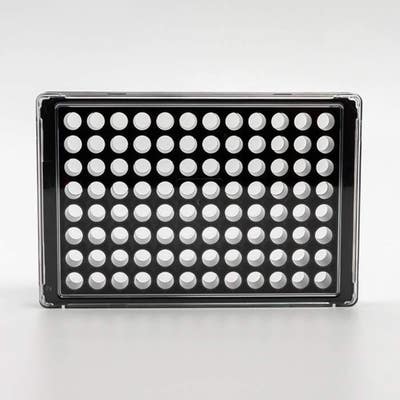
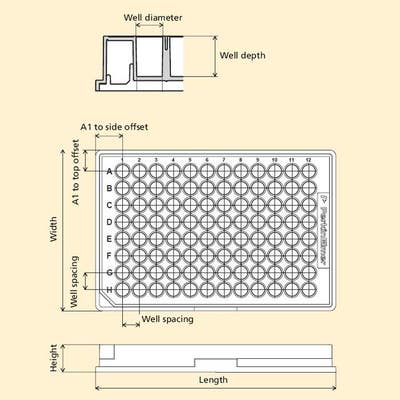
PhenoPlate 96-well, black, optically clear flat-bottom, collagen-coated, lids, case of 160
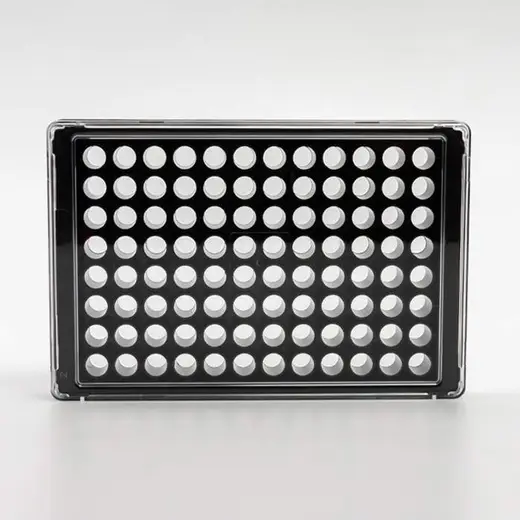
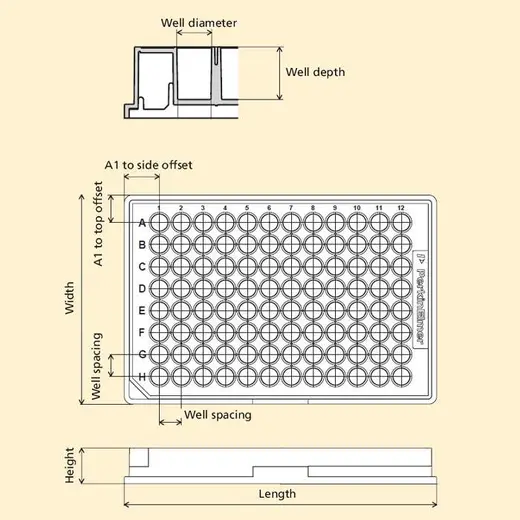


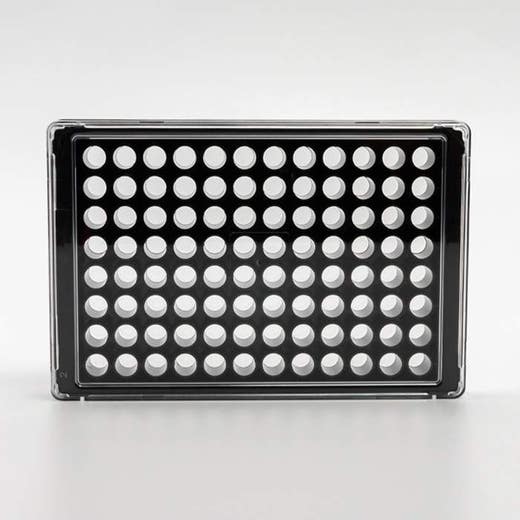
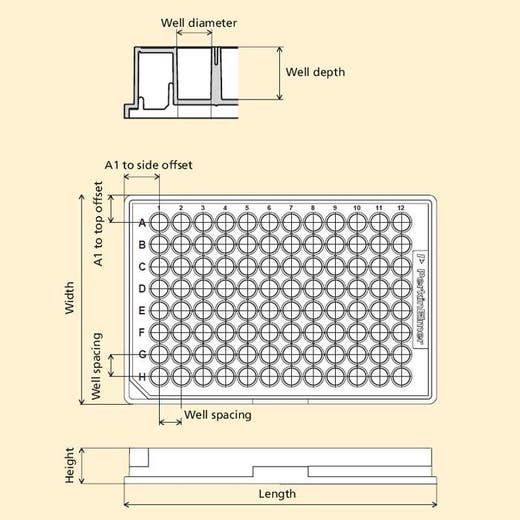


Collagen-coated PhenoPlate™ 96-well microplates (formerly named CellCarrier Ultra microplates) are coated with rat tail type I collagen.
With black well walls and an optically-clear cyclic olefin bottom, collagen-coated PhenoPlate 96-well microplates are ideal for cell culture and imaging with high-content screening systems.
Note: Cyclic olefin is a plastic which has glass-like properties with high optical quality, making it a suitable alternative to ViewPlate-96 Collagen Coated, Black, Glass Bottom, Tissue Culture Treated, 96-well with Lid (part number: 6005720) which is no longer available.
| Feature | Specification |
|---|---|
| Surface Treatment | Collagen coated |
| Color | Black/Clear Bottom |
| Material | Cyclic Olefin |
| Sterility | Aseptic |
| Plate Format | 96 wells |
| Well Shape | Flat-bottom |
Collagen-coated PhenoPlate™ 96-well microplates (formerly named CellCarrier Ultra microplates) are coated with rat tail type I collagen.
With black well walls and an optically-clear cyclic olefin bottom, collagen-coated PhenoPlate 96-well microplates are ideal for cell culture and imaging with high-content screening systems.
Note: Cyclic olefin is a plastic which has glass-like properties with high optical quality, making it a suitable alternative to ViewPlate-96 Collagen Coated, Black, Glass Bottom, Tissue Culture Treated, 96-well with Lid (part number: 6005720) which is no longer available.




PhenoPlate 96-well, black, optically clear flat-bottom, collagen-coated, lids, case of 160




PhenoPlate 96-well, black, optically clear flat-bottom, collagen-coated, lids, case of 160




Product information
Overview
These PhenoPlate 96-well microplates (formerly named CellCarrier Ultra microplates) for high content imaging applications are collagen-coated and are available in black in a 96-well format. The microplates benefit from a film bottom made of cyclic olefin, a plastic that has glass-like optical properties, providing superior image quality and also good cell adherence. They have an ultra-low plate bottom (0.2mm) for better well access when using water immersion and high NA objectives, and a new design, low profile polystyrene lid for reduced evaporation.
Extracellular matrix proteins such as collagen provide an attachment framework for the adhesion and growth of certain cell types in vivo, and can also be used for cell attachment to plate surfaces in vitro. Cellular fibronectin membrane proteins mediate the attachment of cells to collagen substrates. Collagen is the most abundant protein in mammals that is found throughout the body and is a major component of the extracellular matrix (ECM). The most frequently used types of collagen for coating are collagen I and IV. Collagen type I is suitable for endothelial and epithelial cells, muscle cells and hepatocytes. Collagen type IV is the major constituent of basement membranes and offers more physiologically relevant conditions to cells as well as improving the adherence of specific cell types i.e. PC-12 (rat adrenal pheochromocytoma cell line). Our catalog plates are coated with rat tail collagen Type I.
Packaging notes and storage:
- Cases of 40 are packaged as 2 sleeves of 20 plates, lids included
- Cases of 160 are packaged as 8 sleeves of 20 plates, lids included
- Storage Temperature: 4°C
Well plate dimensions
Well format: 96-well
| Description | Specification |
|---|---|
| Number of rows | 8 |
| Number of columns | 12 |
| Well volume | 425 µL |
| Recommended working volume | Up to 300 µL |
| Height (mm) | 14.35 |
| Length (mm) | 127.76 |
| Width (mm) | 85.48 |
| Well diameter top (mm) | 6.84 |
| Well diameter bottom (mm) | 6.4 |
| Well depth (mm) | 12.7 |
| A1 to top offset (mm) | 11.24 |
| A1 to side offset (mm) | 14.38 |
| Well-to-well spacing (mm) | 9 |
Specifications
| Color |
Black/Clear Bottom
|
|---|---|
| Plate Format |
96 wells
|
| Well Shape |
Flat-bottom
|
| Application |
High Content Imaging
Microscopy
|
|---|---|
| Automation Compatible |
Yes
|
| Barcoding Compatibility |
Yes
|
| Brand |
PhenoPlate
|
| Detection Modality |
Fluorescence
|
| Format |
Microplates
|
| Lids Included? |
Yes
|
| Material |
Cyclic Olefin
|
| Packaging |
8 sleeves of 20 plates
|
| Quantity |
160 plates
|
| Shipping Conditions |
Shipped Ambient
|
| Sterility |
Aseptic
|
| Storage Conditions |
4°C
|
| Surface Treatment |
Collagen coated
|
Resources
Are you looking for resources, click on the resource type to explore further.
We know you are working hard to produce the next big breakthrough and the last thing you need to worry about is sub-par quality...
Revvity’s CulturPlates and PhenoPlates are specifically designed to promote cell attachment and growth. These microplates are...
Flyer describing PhenoPlates for High-Content Screening


How can we help you?
We are here to answer your questions.






























